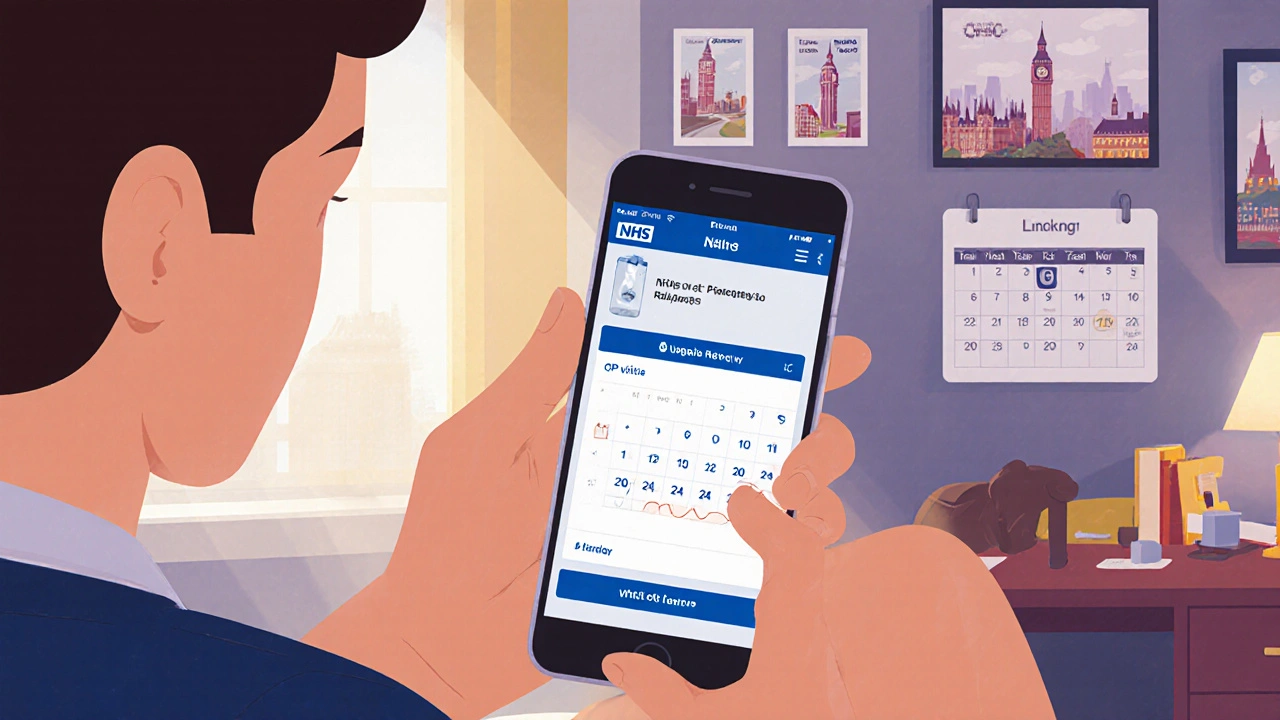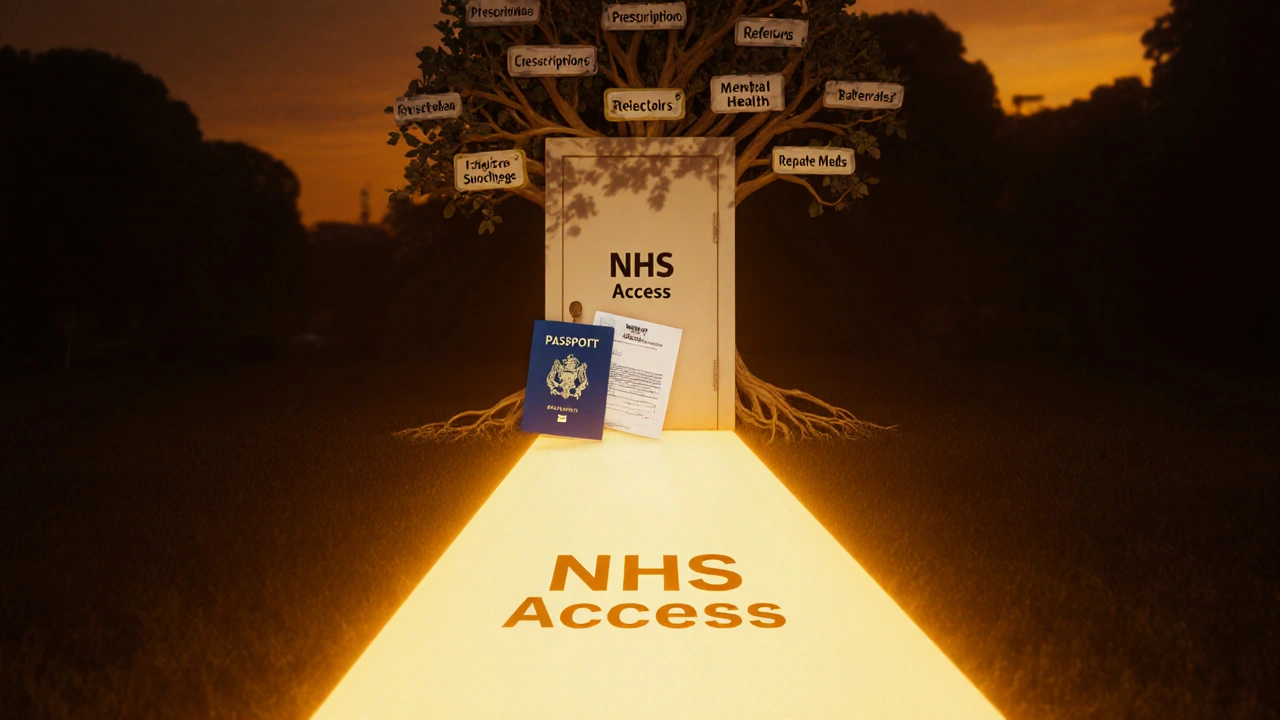
Why you need to register with a GP as an international student in the UK
When you arrive in the UK for your studies, your student visa probably says you’ve paid the Immigration Health Surcharge. That means you’re entitled to free healthcare through the NHS - but only if you register with a GP. Skipping this step isn’t an option. Without a registered GP, you won’t be able to get prescriptions, referrals to specialists, or even basic care for a fever or injury. You’ll end up paying out of pocket for everything, or worse, waiting hours in an emergency room for something that could’ve been fixed in 15 minutes at a local surgery.
Every university in the UK tells you to register with a GP, but few explain how to actually do it. The process isn’t complicated, but it’s different from what you’re used to if you’re coming from the US, Australia, or parts of Asia. In the UK, your GP is your first stop for almost every health issue. Think of them as your personal healthcare manager - they keep your records, coordinate care, and know your history. You don’t walk into a hospital for a cough. You call your GP.
What you need before you register
You don’t need a UK bank account, a UK phone number, or even a permanent address to register. But you do need these three things:
- Your passport or national ID card
- Your student visa (or Biometric Residence Permit if you have one)
- A proof of address - this can be your university accommodation letter, a tenancy agreement, or even a recent utility bill in your name. If you’re staying in university halls, they’ll give you a letter confirming your stay.
Some practices might ask for your NHS number, but you won’t have one yet. Don’t worry - they’ll assign it to you during registration. If you’ve been in the UK before and had a GP, you might still have your old number. Check any past medical letters or your NHS app if you downloaded it.
How to find a GP practice near you
Not every GP practice accepts international students. Some have waiting lists. Others only take patients who live within a certain distance. Use the NHS website to search for practices near your university or accommodation. Go to nhs.uk/service-search/find-a-gp and enter your postcode. You’ll see a list of nearby surgeries with their phone numbers, opening hours, and whether they’re accepting new patients.
Look for practices that say “Accepting international students” or “No residency requirement.” If it doesn’t say that, call them. Ask: “Do you accept international students who are studying here but don’t live in the area permanently?” Most university towns have at least one practice that regularly registers students. If you’re in London, Manchester, or Birmingham, there are dozens.
Don’t just pick the first one on the list. Check reviews on Google or the NHS website. Look for mentions of staff speaking multiple languages, short wait times, and easy appointment booking. A practice that’s easy to reach and understands international students will save you stress later.
How to register - the actual steps
Once you’ve picked a GP practice, go there in person. Don’t just call. Walk in during opening hours. Bring your documents. Ask for the receptionist and say: “I’m an international student and I’d like to register with your practice.”
You’ll be given a registration form. Fill it out. It’s usually one page. They’ll ask for your name, date of birth, address, phone number, and email. They’ll also ask if you’ve seen a doctor in the UK before. Answer honestly. If you’ve had any treatment before, mention it - even if it was minor.
They might ask you to book a health check. This isn’t mandatory, but it’s a good idea. It’s free, takes about 20 minutes, and helps your GP build your medical record. You’ll be asked about your vaccination history, any long-term conditions, allergies, or medications you’re taking. If you’ve had a TB test as part of your visa application, bring the certificate.
After you submit the form, you’ll get a confirmation letter or email within a few days. That’s your official registration. You’ll also get your NHS number - write it down and save it in your phone. Some practices send it via text. Others mail it. If you don’t hear back after a week, call them. Don’t assume it’s done.
What you can and can’t do with a registered GP
Once you’re registered, you can:
- Book appointments for colds, flu, rashes, stomach bugs, mental health check-ins, and more
- Get free prescriptions (you’ll pay £9.90 per item in England, but not in Scotland, Wales, or Northern Ireland)
- Request repeat prescriptions online or by phone
- Get referrals to specialists, physiotherapists, or mental health services
- Access sexual health services, contraception, and STI testing
- Book travel vaccinations if you’re going home for holidays
What you can’t do:
- Walk into a hospital emergency department for non-urgent care - that’s for life-threatening situations only
- Get dental care or eye exams from your GP - those are separate services
- Use your GP for cosmetic treatments or private services
Remember: your GP is your gateway. If you need a specialist, your GP refers you. If you need a blood test, your GP orders it. If you need counselling, your GP can connect you with free NHS therapy. You don’t go straight to the specialist. You go to your GP first.

What to do if you’re sick and your GP is closed
GP surgeries are usually open Monday to Friday, 8am to 6:30pm. Weekends and holidays? They’re closed. But that doesn’t mean you’re stuck.
If you’re sick outside hours, call 111. This is the NHS non-emergency helpline. It’s free, available 24/7, and staffed by trained nurses. They’ll ask you questions and tell you what to do: stay home, go to a pharmacy, book an urgent appointment, or go to A&E. Don’t call 999 unless you’re having a heart attack, severe breathing trouble, or serious injury.
Many universities also have on-campus health centres with extended hours. Check your student portal. Some even offer weekend appointments for students.
Prescriptions, repeat meds, and costs
If your GP prescribes medicine, you’ll get a paper or digital prescription. In England, each item costs £9.90. In Scotland, Wales, and Northern Ireland, prescriptions are free. If you’re on a long-term medication, ask about a repeat prescription. You can order it online through your GP’s website or app - no need to visit in person.
Pharmacies in the UK are called “chemists.” They’re everywhere - in supermarkets, on high streets, and near universities. You don’t need an appointment. Just walk in with your prescription. Staff can answer questions about side effects, interactions, or how to take the medicine. If you’re unsure about a drug, ask. Don’t guess.
What if you move or change universities?
If you switch accommodation or move to a different city for your course, you need to unregister from your old GP and register with a new one. It’s simple. Just call your current practice and say you’re moving. They’ll send your medical records electronically to your new GP. You don’t need to carry paper files.
Don’t wait until you’re sick to do this. Do it as soon as you know you’re moving. If you don’t, your records won’t be transferred, and you’ll lose your medical history. That’s dangerous if you have allergies or chronic conditions.
Common mistakes international students make
Here’s what goes wrong for many students:
- Waiting until they’re sick to register - then they can’t get an appointment for days
- Using emergency rooms for minor issues - leading to long waits and unnecessary costs
- Not keeping their NHS number handy - losing access to online services
- Assuming their home country’s insurance covers them in the UK - it doesn’t
- Not telling their GP about medications they’re bringing from home - some drugs are illegal or restricted in the UK
Don’t be the student who ends up in A&E because they didn’t register. It’s preventable.

How to use the NHS app
Download the NHS app. It’s free. It’s secure. It’s essential. Once you’ve registered with a GP, you’ll get a login code in the mail. Use it to sign in. The app lets you:
- Book and cancel GP appointments
- Order repeat prescriptions
- View your medical record
- See your NHS number
- Check symptoms with a trusted AI tool
Many students don’t know this app exists. Set it up in your first week. It saves you hours every term.
What about mental health?
Studying abroad is stressful. Homesickness, exams, language barriers - they add up. Your GP can help. You don’t need to be in crisis to ask. Just say: “I’ve been feeling overwhelmed lately.” They’ll refer you to free NHS counselling - usually 6-12 sessions. No waiting list for students. Some universities also offer free peer support groups. Use them.
Final checklist before you leave home
- Bring a copy of your vaccination record
- Know the names and dosages of any medications you take
- Have your passport and visa ready
- Save your university’s health centre number
- Download the NHS app
- Write down your NHS number when you get it
What if you’re denied registration?
If a GP practice says no, ask why. Sometimes it’s just a full waiting list. Try another one. If they say you don’t live in their area, remind them that international students are exempt from residency rules under NHS guidelines. If they still refuse, contact your university’s international student office. They have a list of GP practices that regularly accept students and can intervene on your behalf.
Remember: your health is part of your success
Getting sick in a foreign country is scary. But with a registered GP, it’s manageable. You’re not alone. Thousands of international students do this every year. You’ve already taken the hardest part - getting into university. Now take 30 minutes to register with a GP. It’s the single best thing you can do for your health, your peace of mind, and your academic success.
Do I need to pay to register with a GP as an international student?
No, registration is completely free. The Immigration Health Surcharge you paid when applying for your visa covers your NHS access. You won’t be charged to register, book appointments, or see your GP. You only pay for prescriptions in England - £9.90 per item.
Can I register with a GP before I arrive in the UK?
No. You must be physically in the UK and have proof of your address to register. You can start researching practices before you arrive, but you can’t complete the process until you’re here with your documents.
Is dental care covered by the NHS for international students?
No. Dental care is separate from GP services. You’ll need to find a dentist who accepts NHS patients and pay for treatment. Costs vary: check-ups cost around £25, fillings around £70. Some universities offer discounted dental plans for students - ask your student union.
What if I’m from the EU? Do I still need to register?
Yes. Since Brexit, EU students are treated the same as other international students. You must register with a GP to access free NHS care. Your EHIC or GHIC card is no longer valid for ongoing healthcare in the UK - only for temporary visits.
Can I register with a GP outside my university town?
Yes. You can register with any GP in England who accepts new patients, even if they’re not near your university. But if you live in student housing, it’s easier to pick one nearby. Travel time matters when you’re sick.